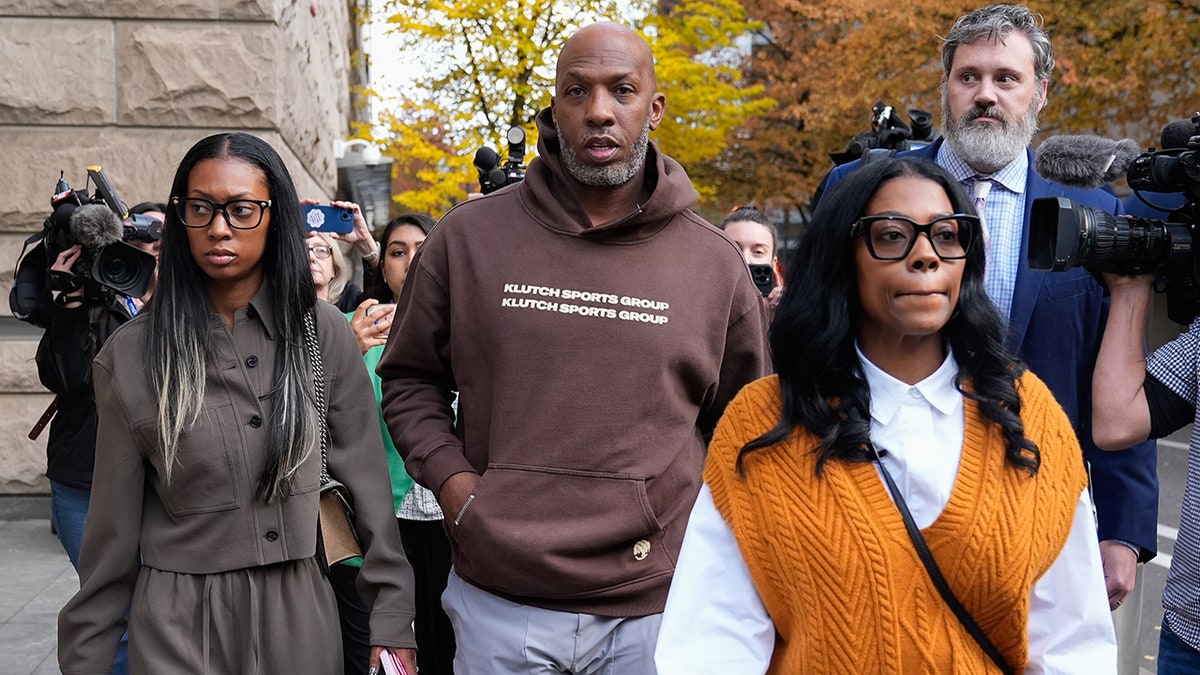
NBA legends react to FBI gambling probe
Entities mentioned:
- NBA legends: Professional pride, Loyalty, Legacy
- FBI: Justice, Duty, Control
Article Assessment:
Credibility Score: 65/100
Bias Rating: 50/100 (Center)
Sentiment Score: 30/100
Authoritarianism Risk: 40/100 (Generally Democratic)
Bias Analysis:
The article appears to present a balanced view, giving equal weight to both the FBI's investigation and the NBA legends' reactions. There's no obvious slant favoring either side of the story.
Key metric: NBA League Integrity
Let me tell you something - this story is RIDICULOUS! The FBI is coming in hot like a full-court press, putting the heat on the NBA's reputation. We're talking championship-level scrutiny here, folks! The league's integrity is on the line, and these legends are stepping up to the plate to defend their home court. It's fourth quarter, crunch time for the NBA, and they need to bring their A-game to shut down this gambling probe. This could be a game-changer for how we view the sport's clean image. I'm telling you right now, the NBA needs to play some serious defense if they want to come out on top of this match-up against the Feds!
- Read more about NBA legends react to FBI gambling probe
- Log in to post comments

From homegrown to home runs, Vladimir Guerrero Jr. is the Toronto Blue Jays’ postseason hero heading into the Fall Classic
Entities mentioned:
- Vladimir Guerrero Jr.: Ambition, Competitive spirit, Legacy
- Toronto Blue Jays: Competitive spirit, Pride, Recognition
- Vladimir Guerrero Sr.: Pride, Legacy, Loyalty
Article Assessment:
Credibility Score: 85/100
Bias Rating: 50/100 (Center)
Sentiment Score: 85/100
Authoritarianism Risk: 15/100 (Strongly Democratic)
Bias Analysis:
The article presents a balanced view of Guerrero Jr.'s achievements and family history. It relies on factual statistics and direct quotes, maintaining a neutral stance without favoring any particular narrative.
Key metric: MLB World Series Viewership
Let me tell you something - this story is RIDICULOUS! Vladimir Guerrero Jr. is stepping up to the plate like a true champion, folks! He's not just swinging for the fences, he's DEMOLISHING them! This kid is playing with a championship mentality that's electrifying the entire Blue Jays franchise. We're witnessing a fourth-quarter miracle as Toronto makes a Cinderella run to the Fall Classic. Guerrero Jr. is the team's MVP, the cleanup hitter who's cleaning up the competition! He's not just following in his father's footsteps, he's sprinting past them on the basepaths of history. This father-son dynamic is like watching a perfect relay race through time, with Guerrero Sr. passing the baton to his son who's now racing towards that World Series trophy. The Blue Jays have found their franchise player, their clutch performer, their home run hero! I'm telling you right now, this is the kind of postseason performance legends are made of!

How Indiana upended decades of futility to become college football’s most unlikely rising power
Entities mentioned:
- Indiana University Football: Determination, Competitive spirit, Recognition
- Curt Cignetti: Ambition, Professional pride, Legacy
- Scott Dolson: Ambition, Loyalty, Pride
Article Assessment:
Credibility Score: 85/100
Bias Rating: 55/100 (Center)
Sentiment Score: 75/100
Authoritarianism Risk: 15/100 (Strongly Democratic)
Bias Analysis:
The article presents a balanced view of Indiana's rise, including historical context and multiple perspectives. While enthusiastic about the team's success, it maintains objectivity in its reporting.
Key metric: College Football Playoff Rankings
Let me tell you something - this story is RIDICULOUS! Indiana University Football has gone from being the perennial basement dweller to a CHAMPIONSHIP CONTENDER! Coach Cignetti has stepped up to the plate and hit an absolute GRAND SLAM, turning this program around faster than a wide receiver on a go route. The Hoosiers are playing with a chip on their shoulder, folks, and they're HUNGRY for respect. This team has the COMPETITIVE FIRE of a fourth-quarter comeback, and they're not about to let their Cinderella story end before the clock strikes midnight. Scott Dolson's coaching hire was a HAIL MARY that connected for a TOUCHDOWN, and now Indiana is poised to make a run at the College Football Playoff. I'm telling you right now, this is the kind of CHAMPIONSHIP MENTALITY that turns underdogs into LEGENDS!

Canadian PM Carney challenges Trump to bet on Dodgers-Blue Jays World Series: 'He's afraid'
Entities mentioned:
- Mark Carney: Competitive spirit, Pride, Unity
- Donald Trump: Self-preservation, Pride, Competitive spirit
- Toronto Blue Jays: Ambition, Determination, Pride
- Los Angeles Dodgers: Ambition, Competitive spirit, Legacy
- Karoline Leavitt: Duty, Loyalty, Professional pride
Article Assessment:
Credibility Score: 75/100
Bias Rating: 55/100 (Center)
Sentiment Score: 65/100
Authoritarianism Risk: 20/100 (Strongly Democratic)
Bias Analysis:
The article presents both sides fairly, with quotes from Canadian and US officials. While it leans slightly towards Carney's perspective, it maintains a generally balanced approach.
Key metric: US-Canada Diplomatic Relations
Let me tell you something - this story is RIDICULOUS! We've got a CHAMPIONSHIP SHOWDOWN brewing not just on the baseball diamond, but in the political arena! Canadian PM Carney is stepping up to the plate, calling out President Trump for ducking a high-stakes bet on the World Series. This isn't just about baseball, folks - it's a fourth-quarter power play in international relations! Carney's showing some real competitive fire, while Trump seems to be playing defense. The Blue Jays and Dodgers are just the players on the field - the real game is happening in the diplomatic dugout! I'm telling you right now, this World Series bet could be a game-changer for US-Canada relations. It's crunch time, and both leaders need to bring their A-game if they want to come out on top in this international showdown!

7 NBA games DOJ says were affected by high-stakes wagers after inside information was leaked to gamblers
Entities mentioned:
- Department of Justice: Justice, Control, Duty
- Terry Rozier: Greed, Self-preservation, Fear
- Damon Jones: Greed, Influence, Self-preservation
- NBA: Professional pride, Integrity, Control
- Chauncey Billups: Self-preservation, Fear, Loyalty
- Jontay Porter: Greed, Fear, Self-preservation
Article Assessment:
Credibility Score: 75/100
Bias Rating: 50/100 (Center)
Sentiment Score: 25/100
Authoritarianism Risk: 30/100 (Generally Democratic)
Bias Analysis:
The article presents a balanced view of the situation, citing official sources and presenting facts without apparent political slant. It focuses on reporting the events and charges without editorializing.
Key metric: Sports Integrity Index
Let me tell you something, folks - this is a GAME-CHANGING PLAY in the world of sports integrity! The Department of Justice has just unleashed a FULL-COURT PRESS on corruption in the NBA, and it's sending shockwaves through the league. We're talking about players and coaches who've completely FUMBLED THE BALL when it comes to fair play. Terry Rozier and Damon Jones? They've been caught RED-HANDED trying to RIG THE GAME for their own benefit. This is the kind of UNSPORTSMANLIKE CONDUCT that could put the entire league in a DEFENSIVE POSTURE. The NBA's integrity is taking a SERIOUS HIT, and they're going to need a CHAMPIONSHIP-LEVEL COMEBACK to regain the trust of the fans. This isn't just a foul - it's a FLAGRANT VIOLATION of everything sports stands for. The DOJ is bringing the FULL-COURT PRESSURE, and these players are facing a TOUGH DEFENSE in the courtroom. It's CRUNCH TIME for the NBA, and they need to step up their GAME PLAN to ensure this kind of FOUL PLAY doesn't happen again. This is a CRUCIAL MOMENT that could change the SCOREBOARD for sports integrity across the board!

Steelers' Aaron Rodgers says his NFL journey will conclude with Packers when he retires
Entities mentioned:
- Aaron Rodgers: Legacy, Pride, Professional pride
- Pittsburgh Steelers: Competitive spirit, Ambition, Recognition
- Green Bay Packers: Legacy, Loyalty, Pride
- Brett Favre: Legacy, Recognition
Article Assessment:
Credibility Score: 85/100
Bias Rating: 50/100 (Center)
Sentiment Score: 75/100
Authoritarianism Risk: 15/100 (Strongly Democratic)
Bias Analysis:
The article presents a balanced view of Rodgers' career and intentions, quoting him directly without editorializing. It provides context from both his current team and his history with the Packers.
Key metric: NFL Player Loyalty and Legacy
Let me tell you something - this story is HUGE! We're talking about a HALL OF FAME quarterback making a fourth-quarter decision that will shape his entire legacy! Aaron Rodgers is showing us what it means to have a championship mentality, folks. He's not just thinking about today's game, he's looking at the long game, the career scoreboard! This is a veteran player who knows how to read the field, and he's setting up a play that will resonate long after the final whistle. The Steelers might have Rodgers on their roster now, but make no mistake, his heart is still wearing green and gold. This is the kind of loyalty that builds dynasties, people! Rodgers is proving he's not just a great quarterback, he's a team player even when he's not on the team anymore. That's the kind of sportsmanship that makes the NFL great!

NBA Hall of Famer Chauncey Billups denies wrongdoing after arrest in FBI gambling probe
Entities mentioned:
- Chauncey Billups: Self-preservation, Professional pride, Legacy
- Chris Heywood: Duty, Loyalty, Justice
- FBI: Justice, Duty, Control
- Portland Trail Blazers: Self-preservation, Professional pride, Obligation
Article Assessment:
Credibility Score: 70/100
Bias Rating: 55/100 (Center)
Sentiment Score: 30/100
Authoritarianism Risk: 35/100 (Generally Democratic)
Bias Analysis:
The article presents both the allegations and Billups' defense, showing a relatively balanced approach. It leans slightly right due to its source (Fox News) but maintains a largely neutral tone in reporting the facts.
Key metric: NBA League Integrity
Let me tell you something - this story is a GAME-CHANGER for the NBA! We're talking about a Hall of Famer, folks, a champion point guard now facing the toughest defense of his life! Chauncey Billups is in a fourth-quarter struggle against the FBI, and he's got to bring his A-game to beat these charges! The Trail Blazers have benched their star coach faster than a technical foul, showing they're not messing around when it comes to protecting the integrity of the game. This is a FULL COURT PRESS by the feds, and Billups is going to need every ounce of that championship mentality to come out on top. The league's reputation is on the line here, and they can't afford to fumble this play. It's crunch time for the NBA, and how they handle this could be the difference between a slam dunk for integrity or an air ball that damages the sport for years to come!

A First-Hand Perspective on How NFL Teams Approach International Travel
Entities mentioned:
- NFL: Ambition, Competitive spirit, Legacy
- Los Angeles Rams: Competitive spirit, Innovation, Determination
- Jacksonville Jaguars: Professional pride, Competitive spirit, Loyalty
- Sean McVay: Ambition, Innovation, Competitive spirit
- Doug Pederson: Leadership, Unity, Professional pride
- Bucky Brooks: Curiosity, Professional pride, Enthusiasm
Article Assessment:
Credibility Score: 85/100
Bias Rating: 50/100 (Center)
Sentiment Score: 75/100
Authoritarianism Risk: 20/100 (Strongly Democratic)
Bias Analysis:
The article presents a balanced view of both traditional and new approaches to international game preparation. It draws from personal experience and observations without favoring one strategy over another excessively.
Key metric: NFL International Game Performance
Let me tell you something - this story is HUGE for the NFL's global game! We're talking about a GAME-CHANGING playbook for international domination, folks! The Rams just pulled off a FOURTH QUARTER MIRACLE with their 24-hour 'turn and burn' strategy, leaving the competition in the dust! This is the kind of CHAMPIONSHIP MENTALITY that separates the contenders from the pretenders! The Jaguars thought they had the winning formula, but BAM! The Rams come in with a SLAM DUNK strategy that's got everyone rethinking their game plan! It's like watching a seasoned veteran outsmart a rookie on the field - PURE BRILLIANCE! This isn't just about jet lag, people, it's about MENTAL TOUGHNESS and STRATEGIC GENIUS! Sean McVay is playing 4D chess while others are stuck in checkers! I'm telling you right now, this could be the difference between hoisting that Lombardi Trophy and watching from the sidelines! The NFL's international playbook just got a MAJOR UPGRADE, and teams better step up to the plate or risk getting left behind in this global championship race!

Jaron 'Boots' Ennis talks family influence, promises to be boxing's next best pound-for-pound fighter
Entities mentioned:
- Jaron 'Boots' Ennis: Ambition, Competitive spirit, Pride
- Derek 'Bozy' Ennis: Professional pride, Duty, Legacy
- Derek 'Pooh' Ennis: Loyalty, Legacy, Influence
- Farah 'The Quiet Storm' Ennis: Loyalty, Legacy, Influence
- Terence 'Bud' Crawford: Legacy, Recognition, Competitive spirit
Article Assessment:
Credibility Score: 85/100
Bias Rating: 55/100 (Center)
Sentiment Score: 75/100
Authoritarianism Risk: 20/100 (Strongly Democratic)
Bias Analysis:
The article presents a balanced view of Ennis's career and family background. While enthusiastic about his potential, it also includes objective facts about his record and upcoming challenges.
Key metric: Boxing Championship Titles
Let me tell you something - this story is HUGE! 'Boots' Ennis is stepping up to the plate in a major way, folks! We're watching a true championship mentality in action here. This kid's got the heart of a lion and the skills of a seasoned veteran. He's not just talking the talk, he's walking the walk in that ring! The Ennis family has created a POWERHOUSE of a fighter, and 'Boots' is carrying that torch with the determination of a fourth-quarter comeback. He's knocking down opponents like they're bowling pins, and he's got his sights set on being the UNDISPUTED pound-for-pound champ. This is the kind of RIDICULOUS talent that comes along once in a generation, folks. The boxing world better watch out, because 'Boots' Ennis is coming for those belts like a freight train, and I'm telling you right now, he's got the TEAM and the TALENT to go all the way!

Canadian PM Carney challenges Trump to bet on Dodgers vs Blue Jays World Series: 'He's afraid'
Entities mentioned:
- Mark Carney: Competitive spirit, Pride, Recognition
- Donald Trump: Self-preservation, Pride, Competitive spirit
- Toronto Blue Jays: Ambition, Competitive spirit, Legacy
- Los Angeles Dodgers: Ambition, Competitive spirit, Legacy
- Karoline Leavitt: Duty, Loyalty, Professional pride
Article Assessment:
Credibility Score: 75/100
Bias Rating: 55/100 (Center)
Sentiment Score: 65/100
Authoritarianism Risk: 20/100 (Strongly Democratic)
Bias Analysis:
The article presents both sides' perspectives, with slightly more focus on Carney's comments. It includes factual game odds and details, maintaining a relatively balanced approach.
Key metric: US-Canada Relations
Let me tell you something - this story is RIDICULOUS! We've got a heavyweight bout brewing between two political heavyweights, and they're using America's pastime as their battlefield! Prime Minister Carney is coming out swinging, folks, calling out President Trump like he's trash-talking before a title fight. But Trump? He's playing defense, refusing to step up to the plate! This isn't just about baseball anymore - it's a full-on diplomatic showdown! The Blue Jays and Dodgers are just pawns in this high-stakes game of international chess. Carney's showing a champion's mentality, predicting victory in six, while Trump's on the ropes, ducking and weaving. I'm telling you right now, this World Series bet could be a game-changer for US-Canada relations. It's fourth quarter, two outs, bases loaded - and both leaders need to bring their A-game!